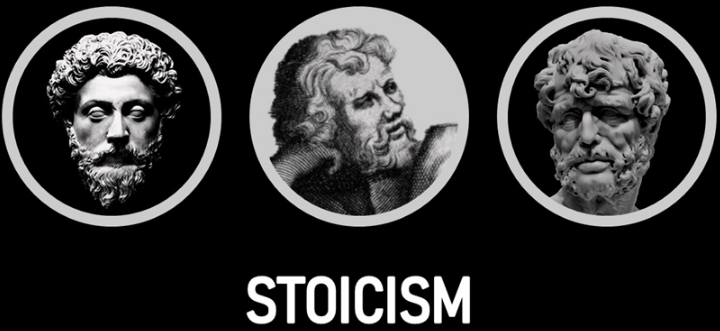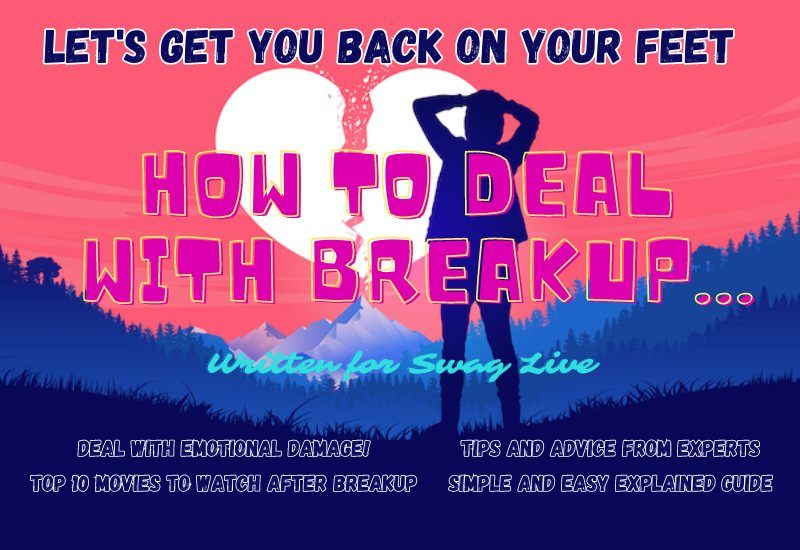I’m writing this article not because I’m going through a breakup. Actually, it’s the opposite—I’m happily in love with a wonderful person. But I know what it feels like to go through breakups, both sudden and unexpected. This article is dedicated to my friend Vlad and all my other buddies who are going through a tough time because someone didn’t want them anymore. I want to show them that there’s a better life waiting if they really want it! So, read this article and start thinking positively.
A Guide to Healing and Moving Forward
Breaking up is never easy. It’s a painful and challenging experience that can leave you feeling lost, hurt, and confused. However, with time and the right approach, you can heal and move forward. Here’s a guide to help you navigate the process of getting over a breakup and embracing new possibilities.
Understanding the breakup: Sounds easy, but it is not.
The first step in getting over a breakup is acknowledging and accepting that the relationship has come to an end. It’s important to recognize that this is a normal part of life and that it’s okay to feel a range of emotions such as grief, anger, and confusion. Take the time to process and understand the reasons behind the breakup, as this can help you learn from the experience and grow as an individual.
Allowing yourself to grieve: Just do not start a drug habit at the same time.
Grieving is an essential part of the healing process. It’s important to validate and process your emotions rather than suppressing them. Give yourself permission to feel the pain and sadness associated with the breakup. Find healthy ways to express and release your feelings, such as through journaling, talking to a trusted friend, or engaging in physical activities like running or yoga. Additionally, setting boundaries with your ex-partner can help facilitate healing by giving you the space and time you need to heal.
Self-care and self-compassion: Clean your house and Clean Your Agenda.
During this challenging time, it’s crucial to prioritize your well-being. Engage in self-care activities that promote your physical, emotional, and mental health. This could involve taking up a new hobby, pampering yourself with a spa day, or simply practicing relaxation techniques like meditation or deep breathing exercises. Build a support system of friends, family, or therapists who can provide comfort, guidance, and a listening ear. Remember to practice self-compassion and avoid blaming yourself for the end of the relationship. Be kind to yourself and understand that healing takes time.
Taking time for personal growth: Go to the gym or Yoga!
Use this period as an opportunity for self-reflection and personal growth. Take the time to reflect on the relationship and learn from it. Consider what you can take away from the experience and how you can apply those lessons to future relationships. Rediscover your identity outside of the relationship and pursue personal goals that bring you joy and fulfillment. Explore new hobbies, interests, or skills that allow you to expand your horizons and find a sense of purpose.
Breaking unhealthy patterns: Stop Sugar and other Bad Stuff.
It’s important to identify and address any negative patterns or behaviors that may have contributed to the breakup. If necessary, seek professional help such as therapy or counseling to work through these issues. Focus on personal development and self-improvement, whether it’s through reading self-help books, attending workshops, or engaging in activities that promote self-growth. Breaking unhealthy patterns will help you create healthier and more fulfilling relationships in the future.

Moving forward and embracing new possibilities: Get out of the house!
Set realistic expectations for the healing process. Understand that healing takes time and that it’s okay to still feel emotional setbacks along the way. When you’re ready, gradually reenter the dating scene, but only when you feel ready and not out of pressure. Embrace the opportunity for personal growth and new beginnings. Allow yourself to be open to new experiences and possibilities that life has to offer.
Coping with reminders and triggers: Just don’t drown in them.
Reminders of the past relationship can be painful and trigger emotional distress. Find ways to manage and reduce the impact of these reminders. This could involve rearranging your living space, engaging in new activities, or seeking support from friends and loved ones. Develop strategies to deal with emotional triggers, such as practicing mindfulness or redirecting your thoughts to positive aspects of your life. Learn to let go of the past and create a new narrative for your future.
Finding closure and forgiveness: You do it only for yourself!
Closure can come in different forms. Seek closure through healthy communication with your ex-partner if it feels appropriate and necessary. Alternatively, find closure through self-reflection and personal growth. Let go of resentment and forgive yourself and your ex-partner for any pain caused. Embrace the idea that closure is an internal process, not something that requires external validation. Focus on your own healing and growth rather than seeking closure solely from the outside.
Staying positive and hopeful: Cause life is fucking awesome.
Cultivate a positive mindset by reframing negative thoughts. Replace self-doubt and negative self-talk with self-affirming and empowering statements. Surround yourself with positivity by seeking out inspirational resources such as books, podcasts, or motivational speakers. Stay hopeful for future relationships and personal happiness. Believe that you deserve love and happiness, and trust that the right person and opportunities will come your way when the time is right.
Getting over a breakup takes time, self-care, and self-reflection. Be patient with yourself as you navigate the healing process. Remember that you are resilient and capable of finding happiness and fulfillment beyond the end of a relationship.
When a child is involved in a breakup

When navigating a breakup involving a child, prioritize the child’s well-being and maintain open communication with your ex-partner. Create a structured co-parenting plan and shield the child from conflicts. Seek professional help if needed and establish consistent routines for stability. Reassure the child that the breakup is not their fault and coordinate major parenting decisions. Take care of yourself to be a better parent and strive for a positive co-parenting relationship based on respect and cooperation. Remember, putting the child first, effective communication, and fostering a supportive environment are key to helping them adjust and thrive amidst the changes.
- Prioritize the well-being of the child: Your child’s well-being should be the top priority. Shield them from any conflicts or negative emotions between you and your ex-partner. Maintain a positive and supportive environment for them.
- Communication with your ex-partner: It’s crucial to establish open and respectful communication with your ex-partner for the sake of co-parenting. Maintain consistent and clear communication about parenting decisions, schedules, and any concerns regarding the child. Focus on the child’s needs rather than personal conflicts.
- Co-parenting arrangements: Create a structured co-parenting plan that outlines custody arrangements, visitation schedules, and responsibilities. This provides stability for the child and reduces potential conflicts. Be flexible and willing to make adjustments when necessary.
- Keep conflict away from the child: Avoid discussing relationship issues or conflicts in front of the child. Refrain from badmouthing your ex-partner, as it can negatively impact the child’s perception of their other parent. Encourage a healthy and loving relationship between the child and both parents.
- Seek professional guidance if needed: If co-parenting becomes challenging or there are significant disagreements, consider seeking the help of a mediator or therapist specializing in family dynamics. They can provide guidance and support in navigating co-parenting challenges.
- Consistency and routine: Establish consistent routines for the child to provide stability and a sense of security. Consistency in rules, expectations, and daily activities can help the child adjust to the changes and minimize any potential disruptions.
- Reassure the child: Help your child understand the breakup in an age-appropriate manner. Reassure them that the separation is not their fault and that both parents love them unconditionally. Offer them the opportunity to express their feelings and concerns and provide reassurance and support.
- Coordinating parenting decisions: Make an effort to coordinate major parenting decisions with your ex-partner. Consult each other on important matters such as education, healthcare, and discipline to ensure consistency and mutual involvement in the child’s life.
- Self-care for yourself: Taking care of yourself is crucial to be the best parent you can be. Engage in self-care activities, seek support from friends or a therapist, and manage your own emotions effectively. Remember that your well-being directly impacts your ability to support and care for your child.
- Focus on positive co-parenting: Aim for a positive co-parenting relationship based on respect, cooperation, and shared parenting goals. By fostering a healthy co-parenting dynamic, you can provide a nurturing and stable environment for your child.
Heal your soul and allow yourself to read this text!

A word from Dr. Rouwendaal, a relation therapist The Netherlands.
Going through a breakup is undeniably painful, but it also has the potential to make our souls stronger and lead us on a journey of self-discovery. In the midst of heartache, it can be challenging to see beyond the pain. However, it is important to approach the experience with a positive mindset and recognize the opportunities for growth that lie within.
The end of a relationship provides a unique opportunity to reconnect with ourselves and rediscover our true essence. It is a chance to reflect on the lessons learned, both from the relationship itself and the subsequent breakup. This introspection allows us to gain a deeper understanding of our needs, desires, and boundaries, ultimately guiding us towards a clearer sense of self.
As we navigate the healing process, it is crucial to prioritize self-care and self-love. Engaging in activities that bring us joy and fulfillment, whether it be pursuing hobbies, spending time in nature, or practicing mindfulness, nurtures our well-being and helps rebuild our sense of identity. Surrounding ourselves with a supportive network of loved ones and seeking guidance from professionals can also provide valuable perspectives and encouragement during this transformative journey.
While the pain of a breakup may seem insurmountable at times, it is through this adversity that our souls find strength. Embracing the challenges as catalysts for growth allows us to emerge from the experience with newfound resilience, wisdom, and a deeper connection to ourselves. As we rediscover our passions, set personal goals, and cultivate self-love, we create the foundation for a brighter and more empowered future. With each step forward, we embrace the opportunity to not only heal but also to flourish into the best version of ourselves.
2022- November – Taken from his story: Pain: It Really Hurts
A breakup can really hurt
Experiencing a breakup can be an emotionally and physically painful experience. While emotional pain is more readily understood, it is interesting to explore why a breakup can also manifest as physical pain in our bodies. It’s important to note that the physical pain experienced during a breakup is subjective and can vary from person to person. While these factors help explain the physical aspect of a breakup, it’s essential to prioritize self-care, seek support from loved ones or professionals, and allow yourself time to heal both emotionally and physically. Here are some reasons why a breakup can physically hurt:
- Attachment and Loss: When we form a deep emotional connection with someone, our brains release chemicals like oxytocin and dopamine, which create feelings of attachment and pleasure. A breakup disrupts this attachment, causing a loss of those pleasurable feelings. The sudden absence of these chemicals can lead to physical symptoms akin to withdrawal, including aches, fatigue, and even nausea.
- Stress Response: Going through a breakup triggers a stress response in our bodies. The stress hormone cortisol is released, which can have physical effects such as headaches, muscle tension, and an increased heart rate. The ongoing stress can weaken our immune system, making us more susceptible to illnesses and experiencing general discomfort.
- Emotional Distress and the Mind-Body Connection: Our emotional state profoundly influences our physical well-being. The pain, sadness, and anxiety associated with a breakup can manifest physically through symptoms like chest tightness, shortness of breath, and stomachaches. This mind-body connection highlights how our emotions can impact our physical sensations.
- Disrupted Sleep Patterns: Breakups often lead to sleep disturbances, with many individuals experiencing insomnia or disrupted sleep. Sleep deprivation can lower pain thresholds and contribute to feelings of physical discomfort and fatigue.
- Loss of Routine and Social Support: A breakup often results in significant changes to our daily routines and social dynamics. Loss of shared activities, support networks, and companionship can lead to feelings of isolation, which in turn may contribute to physical symptoms like headaches, appetite changes, and lethargy.
- Psychological Distress: The emotional distress caused by a breakup can contribute to the development or exacerbation of mental health conditions like depression and anxiety. These conditions can present physical symptoms such as body aches, changes in appetite, and gastrointestinal issues.
10 Movies Guys should watch going through a Breakup.

Going through a breakup can be tough, and watching movies can be a great way to find comfort, distraction, and even some valuable life lessons. Here’s a top 10 movie list that guys may find helpful after a breakup:
- “Swingers” (1996): This comedy-drama follows a group of friends navigating the dating scene after a breakup, offering a humorous and relatable take on moving on.
- “Forgetting Sarah Marshall” (2008): A comedy about a guy who travels to Hawaii to heal his broken heart, encountering hilarious and unexpected adventures along the way.
- “500 Days of Summer” (2009): A heartfelt romantic comedy that explores the highs and lows of love and the importance of self-discovery.
- “Rocky” (1976): This classic underdog story can inspire resilience and determination, reminding you that you have the strength to overcome any challenge.
- “Into the Wild” (2007): Based on a true story, this film follows a man who embarks on a journey of self-discovery in the wilderness, reminding viewers of the importance of finding oneself.
- “The Pursuit of Happyness” (2006): A powerful drama based on a true story, showcasing the triumph of the human spirit and the importance of perseverance in the face of adversity.
- “The Social Network” (2010): A compelling drama that highlights the power of determination and ambition, inspiring you to focus on personal growth and success.
- “Silver Linings Playbook” (2012): A heartwarming romantic comedy-drama that explores the complexities of relationships and finding hope and happiness in unexpected places.
- “Good Will Hunting” (1997): This drama showcases the journey of a young man overcoming his past and discovering his true potential, emphasizing the importance of self-worth.
- “Eternal Sunshine of the Spotless Mind” (2004): A thought-provoking romantic sci-fi film that explores the complexities of love, memory, and the healing power of moving forward.
10 Movies Women should watch going through a Breakup.
Here’s a top 10 movie list that women may find helpful and empowering after a breakup, I actually checked with 2 of my former relationships, and they all agreed to the list. They also told me to never call them again, but I was not able to find that movie.
- “Legally Blonde” (2001): A lighthearted comedy that follows a determined woman as she proves her worth and achieves success on her own terms, showcasing the power of self-belief.
- “Under the Tuscan Sun” (2003): A romantic drama about a woman who rebuilds her life and finds love after a divorce by embracing new experiences in the picturesque Tuscan countryside.
- “Wild” (2014): Based on a true story, this inspiring film follows a woman who embarks on a solo hike along the Pacific Crest Trail, seeking self-discovery and healing after a series of personal hardships.
- “Eat Pray Love” (2010): The film adaptation of Elizabeth Gilbert’s memoir, as mentioned earlier, where a woman embarks on a transformative journey around the world to find herself after a divorce.
- “Little Women” (2019): A heartwarming adaptation of Louisa May Alcott’s beloved novel, which celebrates the bonds of sisterhood, resilience, and the pursuit of dreams.
- “How to Be Single” (2016): This comedy explores the experiences of a woman navigating single life in a bustling city, emphasizing the importance of self-discovery, independence, and female friendships.
- “Bridget Jones’s Diary” (2001): A romantic comedy about a relatable and endearing woman who learns to embrace her imperfections and find love while navigating the ups and downs of dating.
- “The Devil Wears Prada” (2006): A witty and empowering film that follows a young woman’s journey as she navigates the fashion industry, highlighting the importance of self-confidence and staying true to oneself.
- “Silver Linings Playbook” (2012): As mentioned earlier, this heartfelt film explores the complexities of relationships and the power of finding hope and happiness in unexpected places.
- “The Help” (2011): A powerful drama that showcases the strength and resilience of women as they challenge societal norms and fight for justice and equality in 1960s Mississippi.
Here are some key ideas from Stoicism

Stoicism, an ancient philosophy founded by Greek philosophers like Zeno of Citium and Epictetus, provides valuable insights on how to approach and process breakups. Drawing from Stoic principles can help us navigate the emotional challenges of a breakup with resilience and wisdom.
- Acceptance of what is beyond our control: Stoicism teaches us to accept the realities of life, including the end of a relationship. By acknowledging that some things are outside of our control, we can focus on what we can change.
- Cultivating emotional resilience: Stoicism encourages us to develop emotional resilience and maintain inner tranquility in difficult times. This involves understanding that our emotions and reactions are within our control and choosing to respond with reason and composure.
- Focusing on internal virtues: Stoicism emphasizes the development of virtues such as wisdom, courage, and self-discipline. By cultivating these virtues, we can navigate the challenges of a breakup and grow as individuals.
- Practicing gratitude and gaining perspective: Stoics advocate for cultivating gratitude and maintaining a broader perspective in life. By appreciating what we have and adopting a broader view, we can find solace and discover opportunities for personal growth.
- Letting go of attachments: Stoicism encourages us to avoid excessive attachment to external things, including relationships. By recognizing that relationships are impermanent, we can find inner peace and independence.
For a more comprehensive understanding of Stoicism and its application to various aspects of life, including breakups, you may find the following online resources helpful:
- The Daily Stoic: A website and newsletter that offers daily Stoic teachings, practical exercises, and additional resources for personal growth.
- Stoicism Today: An online platform featuring articles, interviews, and discussions on Stoicism in modern life.
- Stoicism Subreddit: An online community where you can engage with fellow Stoic practitioners, seek guidance, and find recommended readings.
Remember, exploring different philosophies and coping strategies can help you navigate the challenges of a breakup and find the path to healing and self-discovery.
You can say something nice
It’s always a drag to find the right words when someone is in a difficult time. But we have a list of openings that you can forward and get a conversation going. If you can help a friend get through a bad time, then by all means, do it!
- I’m here for you, no matter what.
- Take all the time you need to heal.
- Your feelings are valid and it’s okay to grieve.
- You are stronger than you realize.
- It’s not the end of your story; it’s a new beginning.
- You deserve happiness and love.
- I believe in your ability to overcome this.
- Remember, you are worthy of a healthy and fulfilling relationship.
- It’s okay to lean on others for support during this time.
- Your heart will mend, and you will find love again.
- Focus on taking care of yourself right now.
- You have so many wonderful qualities to offer someone.
- Allow yourself to feel all the emotions and process them.
- This experience will make you grow and become even stronger.
- You are not alone; many people have gone through this and come out stronger.
- I’m proud of you for facing this head-on.
- Trust that time will heal your wounds.
- It’s normal to have ups and downs in the healing process.
- Surround yourself with people who lift you up.
- I admire your resilience and courage.
- You are not defined by this breakup; you are defined by your strength.
- Remember to be kind and patient with yourself.
- It’s okay to miss the good times while also acknowledging the reasons it ended.
- I’m here to listen whenever you want to talk.
- You are deserving of love and happiness, even if it feels difficult right now.
- You have so much potential for growth and self-discovery.
- It’s okay to prioritize your own well-being and needs.
- The pain will subside, and you will find peace.
- Don’t rush the healing process; take it one day at a time.
- You are worthy of someone who will love and appreciate you fully.
- Give yourself permission to let go and move forward.
- Focus on the lessons learned and how they will shape your future relationships.
- Take this time to rediscover yourself and pursue your passions.
- Your future holds endless possibilities.
- You are loved and supported by those who care about you.
- This breakup does not define your worth or value.
- It’s okay to have bad days; remember to be patient with yourself.
- Your happiness is not dependent on anyone else; it comes from within.
- Your strength is inspiring, even when you don’t feel it.
- This is an opportunity for personal growth and self-improvement.
- It’s normal to have mixed emotions; they will eventually become clearer.
- Your journey is unique, and it will lead you to a better place.
- Surround yourself with positivity and uplifting experiences.
- It’s okay to focus on yourself and prioritize your own needs.
- You are not alone; reach out for support when you need it.
- This pain will not last forever, even though it feels overwhelming now.
- Embrace this chapter of your life and the growth that comes with it.
- Trust in the process of healing, even if it feels slow at times.
- Know that you are cherished and valued by those who truly care about you.
- You are deserving of a love that is healthy, fulfilling, and true.
Remember, these words of support can provide comfort to someone going through a breakup, they also work for both genders. I hope you are getting through the rough times, and I and at least a hundred million other guys can say “You’ll get through it” … just don’t start drinking or doing drugs while you are grieving. It only prolongs the process of pain and makes it harder to heal. We wrote about how to prevent a breakup.




